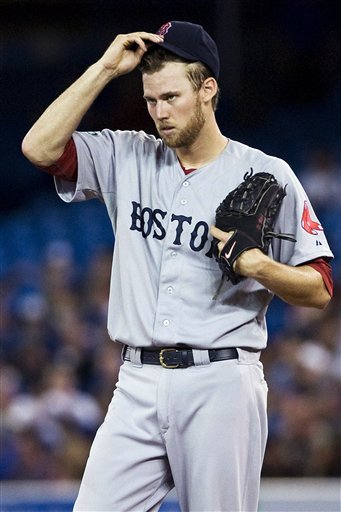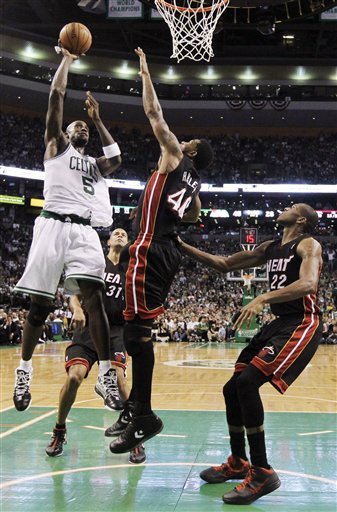He's won two Vezinas and a Conn Smythe here. And he's the player most responsible for the Bruins' 2011 Stanley Cup Championship. Yet some people in this town accuse him of "putting himself above the team." Why? Because he didn't pose for a picture with Barack Obama and because he wants to spend a year with his family. How horrible and selfish of him.
Tim Thomas is taking a year off from hockey. He announced it yesterday on his Facebook page. He's not retiring. And so the Bruins are still responsible for the $5 million cap hit, even if the team suspends him. Legally, he still owes the Bruins a year of hockey, and they still owe him $3 million of salary (the cap number is the average yearly salary of the entire contract). The Bruins can "toll" Thomas' contract, which would mean taking the cap hit now, then having Thomas play for them in 2013-14 without a cap hit.
In any scenario, the Bruins still have to assume the $5 million cap hit. It's a stupid stipulation of the NHL's overly simplistic salary cap. It's a silly rule made to protect the poorly constructed cap from being taken advantage of. Sort of like duct-tape used to hold together rusty iron girders that support a skyscraper.
Why not just retire now? That's a question that some are asking. And then following up with a "he's putting himself above the team" type of statement.
The problem is, even if Tim Thomas retires, the Bruins are still responsible for $5 million against the cap. At least that's what a clause in the NHL CBA seems to read. It's a clause for players signed to deals when they're 35 or older:
“All Player Salary and Bonuses earned in a League Year by a Player who is in the second or later year of a multi-year SPC [standard player contract] which was signed when the Player was age 35 or older (as of June 30 prior to the League Year in which the SPC is to be effective), regardless of whether, or where, the Player is playing, except to the extent the Player is playing under his SPC in the minor leagues, in which case only the Player Salary and Bonuses in excess of $100,000 shall count towards the calculation of Actual Club Salary;”
I haven't gone to Law School, but I think what this part of the CBA states is that if a player who is 35+ years old signs a deal, the team's cap number must include his salary for the duration of the contract, even if he's retired (that's the "regardless of whether, or where, the Player is playing..." part).
The point of this rule is to prevent teams from signing close-to-retirement players to big long-term contracts that are frontloaded. You don't want a team signing a 39 year old player to a 20 year, $20 million deal ($1 million cap hit per season), that pays him $9 million each of the first two years, then he retires after getting paid $18 million, but the team only had a $1 million cap hit.
Tim Thomas signed his current contract on April 2, 2009. That's 13 days before he turned 35. But the rule has a stipulation. If the player is 35+ when the terms of the deal take effect (the start of 2009-10 season for Thomas' deal), then the rule is in effect. Thomas was 35 at the start of the 2009-10 season.
So Thomas' $5 million cap hit was going to be in effect even if he retired. It would only not affect the Bruins if he were traded. Of course, his desire to take a year off severely reduces his trade value. I'm sure the Bruins will try to make a deal with other teams, but it's going to be hard to get much value for a 38 year old goalie who will be hanging out in Colorado for a year until he's 39.
So Thomas did put something ahead of the team. He admitted as much in his Facebook announcement. He wants to focus on his family. On his life off the ice. And because of that, the Bruins will struggle more to trade him. To tell the truth, though, his trade value wasn't incredibly high to begin with. He has one year left on his deal, he's 38 years old, he peaked in 2011. Struggling teams would want a more longer-term solution in net, and almost all of the contending teams already have their goalies in place.
I don't know about anyone else, but I'm fine with Thomas putting himself and his family ahead of the Bruins' ability to trade him. And if he doesn't want to play, he doesn't want to play.
What he is taking from the Bruins now is so small and trivial compared to what he gave the Bruins and their fans last spring and summer. Only two Bruins have won the Conn Smythe Trophy. Bobby Orr is one of them. Tim Thomas is the other. I think the balance sheet of what Thomas has given the Bruins and what he's taken away by taking a year off shows that the B's are well in the black.
So good luck, Timmy.



